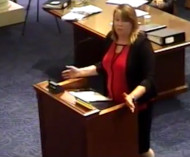8/15/2018
Iowa Supreme Court Returns To Speed Camera QuestionIowa Supreme Court justices question whether speed camera ticket notices in Des Moines violated due process.

Iowa's highest court has handed down rulings favorable to speed cameras on multiple occasions. In May, the high court torpedoed state Department of Transportation regulations designed to cut down on unfair freeway speed traps (view ruling). In 2008, justices gave cities the green light to install cameras without legislative authorization (view ruling), and it used that ruling to shoot down a 2015 due process challenge (view decision). Last week, the Iowa Supreme Court returned to the due process issue in considering a class action challenge to the wording of the tickets mailed to vehicle owners.
Michelle Mackel-Wideranders, the attorney representing the city of Des Moines, pointed out that the motorists who were challenging their tickets could have appealed to a district court, but they did not do so. Justice Brent R. Appel took the opportunity to frame the central question in the case.
"How do we know that wasn't because of the misleading language in the notices?" Justice Appel asked. "The notice itself says 'Judgment.' ...It wasn't a judgment of any kind. And there's an admonition about 'You may be referred to a collections agency.' ...Can you use these kinds of notices to convince people to pay rather to go on to a municipal hearing, consistent with due process?"
The attorney representing Des Moines conceded that the language was imperfect and "misleading."
"If someone paid up in reliance on those statements would that be a due process problem?" Justice Appel asked.
Mackel-Wideranders said it was not because there was a clarification in the fine print on the second page. Chief Justice Mark S. Cady found the language on the second page unnecessarily confusing.
"What should we require of government when people are faced with this choice and all they have is this notice to look at?" Justice Cady said. "You can't examine the law very carefully to sort this out, either... It seems it could have been explained pretty clearly to people just what their options are."
Justice David S. Wiggins asked whether the notice was intentionally designed to steer the public away from a court hearings that would reduce the program's profit margin.
"If you have to go to the municipal infraction, the city has to pay the court costs and filing fees," Justice Wiggins pointed out. "So it's an extra cost that the city may not recover."
The motorists' attorney, James Larew, insisted that the city could not constitutionally direct motorists in this way. He pointed out that motorist would call a phone number run by the Swedish speed camera company Gatso that never explained any alternative options. He also argued that the city was not following the letter of its own ordinance and state law.
"How did they invent this sideshow where all the people were shunted?" Larew asked. "The city found due process to be inconvenient, to be too expensive. They wanted to have a high velocity prosecution system."


